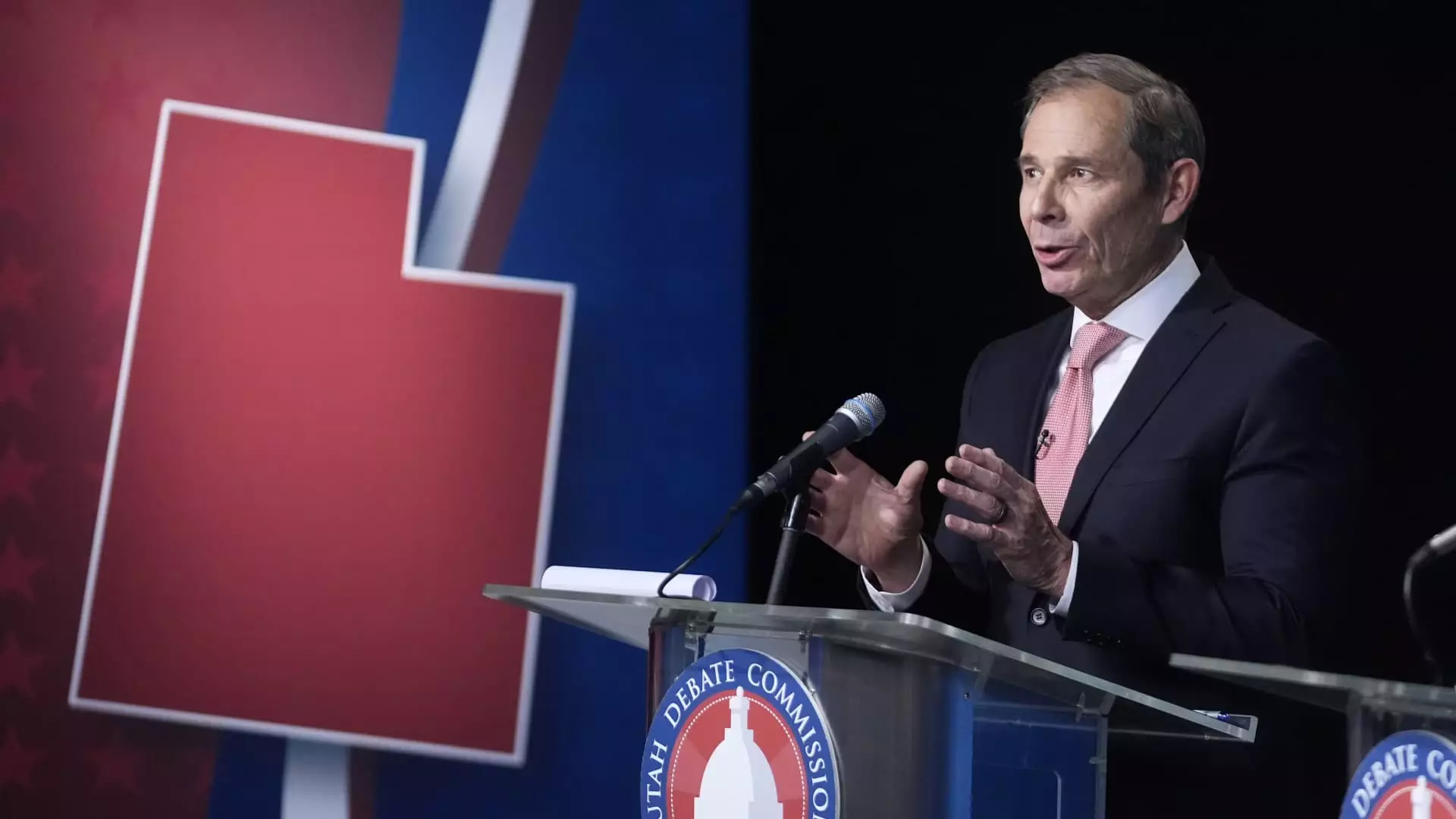In recent years, the evolving landscape of cryptocurrency has begun to carve out a significant niche within political campaigns, shaping the dynamics of elections across the United States. This not only highlights the burgeoning influence of digital currencies but also points to a growing recognition among legislators regarding their importance in economic growth and innovation. One prominent figure emerging at the intersection of crypto and politics is John Curtis, a Republican congressman from Utah, who has garnered the support of the crypto community as he seeks to fill the Senate seat vacated by Mitt Romney.
Curtis’s ascent in the political arena has been marked by an unexpected journey through the telecommunications sector. His unique background laid the foundation for his current engagement with the complexities of internet services and, by extension, the digital currency domain. During a recent event in Salt Lake City, Curtis recounted a pivotal moment when he challenged fellow lawmakers on their understanding of internet service speeds. His realization about the disconnect between legislators and the user experience spurred him to advocate for a more informed legislative approach, especially regarding cryptocurrency.
In his dialogue at the Permissionless conference, Curtis articulated the necessity for lawmakers to grasp the intricacies of digital assets. He emphasized that a lack of understanding can lead to ill-informed regulations that stifle innovation within the industry. It is this proactive stance that has resonated with crypto enthusiasts and investors, establishing Curtis as a key ally. With support pouring in from organizations like the Defend American Jobs PAC—focused solely on crypto advocacy—Curtis’s campaign has attracted considerable financial backing from the digital asset industry itself. The stark contrast between Curtis’s approach and that of his Democratic opponent Caroline Gleich has placed Curtis in a position poised for potential electoral success.
The financial landscape of the 2024 election cycle reveals a remarkable reality: the crypto industry has emerged as a formidable force in political contributions. According to data analyzed by experts in the field, cryptocurrency-related donations have surged, surpassing traditional sectors like banking and oil. The data indicates that nearly half of the contributions from corporations are now linked to the digital asset sector, underscoring its significant presence in political financing.
Super PACs have increasingly recognized the potential to steer political outcomes by supporting candidates who align with pro-crypto stances. As evidenced by Curtis’s fundraising achievements, these organizations have mobilized considerable resources, with over $130 million funneled into congressional races this election cycle alone. The data also suggest that around 40 million Americans possess cryptocurrency holdings, and a majority of them are inclined to support candidates who advocate for favorable regulatory environments.
The Call for Regulatory Balance
As Curtis navigates his campaign, he firmly believes that the cryptocurrency industry must prioritize self-regulation while collaborating with lawmakers to establish reasonable frameworks for oversight. This approach aims to foster a balance between ensuring user security and avoiding excessive government intrusion that could stifle innovation. This notion has resonated with several crypto-backed PACs, including those associated with notable entities like Coinbase and Andreessen Horowitz, which are actively promoting candidates who champion reasonable regulation.
Targeting key Senate and House races, these PACs have leveraged substantial funding to influence electoral outcomes. For instance, Democrats like Ruben Gallego in Arizona and Elissa Slotkin in Michigan have received visible support, while Republicans in swing states have also garnered significant contributions. The strategy highlights a shift toward a more agnostic approach to political party affiliation, driven by a shared goal of promoting favorable policies for digital assets.
However, the political landscape is not devoid of challenges for the crypto industry. Certain entrenched figures, such as Elizabeth Warren, have positioned themselves as adversaries to pro-crypto policies, emphasizing the need for stringent oversight. The industry recognizes the uphill battle of displacing these incumbents but aims to strategically support candidates who can effectively counteract anti-crypto sentiments.
In particular, campaigns targeting Democratic Sen. Sherrod Brown, who chairs the banking committee, have witnessed a deluge of funding, underscoring the stakes involved in influencing legislative control. This electoral year serves as a critical juncture, with substantial investments directed toward candidates who promise to reshape the regulatory approach toward the cryptocurrency landscape.
As John Curtis navigates the complexities of his Senate bid, the increasing involvement of the crypto sector in political financing signifies a pivotal transformation in the electoral process. By fostering connections between lawmakers and the burgeoning digital asset community, Curtis embodies a new breed of politician—one who champions innovation while recognizing the critical importance of informed regulation. The future of cryptocurrency will hinge not only on market dynamics but also on the willingness of lawmakers to engage with and understand this ever-evolving industry. As the 2024 elections approach, the narrative surrounding cryptocurrency’s political influence continues to unfold, with stakeholders on both sides bracing for a transformative impact on the American political landscape.

